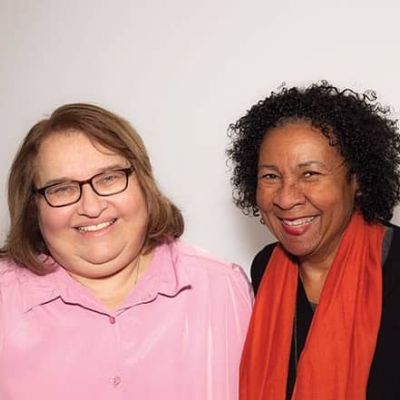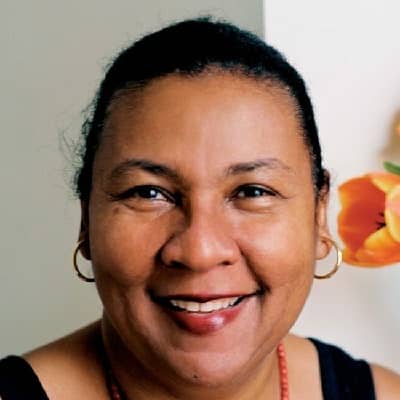Bell Hooks was an author, theorist, educator, and social critic. She is known for her writings on race, feminism, and class inequality.
Table of Contents
Wiki, Bio, Family, Siblings, Childhood & Education
Gloria Jean Watkins was born Bell Hooks on September 25, 1952, in Hopkinsville, Kentucky, United States. Her death occurred when she was 69 years old. She was one of six children born to Veodis Watkins and Rosa Bell Watkins. Similarly, her father worked as a housekeeper and her mother as a maid in white folks’ homes.
Angela, Valeria, Theresa, Kenneth, Gwenda, and Sarah are her six siblings. Watkins wrote in her memoirs Bone Black: Memories of Girlhood (1996) of her “struggle to create self and identity” while growing up in “a rich magical world of southern black culture that was sometimes paradisiacal and at other times terrifying.” Similarly, she was of African-American ethnicity and had American nationality.
Furthermore, Watkins, who appreciates the poetry of Gwendolyn Brooks, Langston Hughes, Elizabeth Barrett Browning, and William Wordsworth, was educated in racially segregated public schools before switching to an integrated one in the late 1960s. Her book Teaching to Transgress: Education as the Practice of Freedom demonstrates the profound impact this event had on her as an educator as well as the scholarship it sparked on educational practices.
She earned her BA in English from Stanford University in 1973 and her MA in English from the University of Wisconsin-Madison in 1976 after finishing high school. Watkins was working on her book, Ain’t I a Woman: Black Women and Feminism, which she began writing when she was 19 (approximately in 1971) and published (as the pen name bell hooks) in 1981.
Hooks received her doctorate in English from the University of California, Santa Cruz in 1983, after several years of writing and teaching. Her dissertation, “Keeping a Hold on Life: Reading Toni Morrison’s Fiction,” was about the author Toni Morrison.
Bell Hooks’s Age, Height, Weight, and Body Dimensions
However, no information on her physical stats, such as height, weight, body size, dress size, shoe size, and so on, is provided. However, based on her photographs, we may presume she had black eyes and black hair.

Bell Hooks’s Profession & Career
Hooks was influenced by American abolitionist and feminist Sojourner Truth. Truth’s “Ain’t I a Woman?” inspired Hooks’ first important work. Bell Hooks’ book Teaching to Transgress also mentions Brazilian educator Paulo Freire. His perspectives on education are provided in the opening chapter, “Engaged Pedagogy.” African American writer James Baldwin, Buddhist monk Thich Nht Hnh, dramatist Lorraine Hansberry, and Peruvian theologian Gustavo Gutiérrez are among his other influences.
Writing and teaching
She began her academic career in 1976 as an English professor and senior lecturer in ethnic studies at the University of Southern California. Her first published work was a chapbook of poems titled And There We Wept (1978), which was published by the Los Angeles publisher Golemics during her three years there under the pen name “bell hooks.” She went on to say that she did so in honor of her great-grandmother and to underline the importance of focusing on her writings rather than her personality: “the substance of books, not who [she is].”
Bell Hooks also began serving as an honorary professor in residence at Berea College in 2004. She discussed her intention to return to Kentucky with author Wendell Berry for her 2008 book, Belong a Culture of Place. She was a student in residence at The New School for three terms, the last of which was in 2014. Berea College also launched the Bell Hooks Institute in 2014. She donated her documents there in 2017.
More…
While a student at Berea College, bell hooks started the bell hooks center with her lecturer Dr. M. Shadee Malaklou. The center was established to provide a safe space for minority students at Berea College to enhance their activist expression, education, and work, particularly for black and brown, femme, queer, and Appalachian folks. The idea and guiding concepts for the center are based on bell hooks’ writings and her emphasis on the importance of feminism and love.
Furthermore, the center is still in existence today, offering anti-racist and radical feminist events and programs. She was inducted into the Kentucky Writers Hall of Fame in 2018. During the George Floyd protests in 2020, Hooks’ writing on racism, feminism, and capitalism received a renaissance. Her groundbreaking work is still important in today’s political and social context in the United States.
Bell Hooks’s Husband, Marriage & Relationship
Hooks described her sexual orientation as “queer-pas-gay.” She used the French word “pas,” which is the English word “not.” Hooks describes being gay as “not about who you’re having sex with, but about being at odds with everything around it.”
Bell Hooks disclosed to Abigail Bereola in 2017 that she was unmarried during a talk about her personal life. Hooks revealed to Bereola during the interview, “I don’t have a partner.” I’ve been unattached for seventeen years. Despite the fact that I would enjoy a spouse, I do not believe my life would be any less meaningful without one.
Death
She died on December 15, 2021, at the age of 69. After a long fight with cancer and kidney failure, the American philosopher died at her Berea home in the presence of her loved ones.
Buddhism
Hooks grew interested in Beat poetry in her early undergraduate years, and she first learned about Buddhism after meeting poet and Buddhist Gary Snyder. Hooks assimilated Buddhism into her Christian upbringing after her initial contact with it; this fusion of Christian and Buddhist ideas had an ongoing impact on Hooks’ identity, activism, and literature.
She was drawn to Buddhism because it offered her both an intellectual and personal foundation for understanding and reacting to both love and connection as well as sorrow and discrimination. She states that the Christian-Buddhist emphasis on routine practice satisfies her daily grounding and centering needs. Hooks’ essays, books, and poetry regularly allude to Buddhist concepts, particularly those of Thich Nht Hnh. Buddhist spirituality also had an important role in the formation of the love ethic, which became a central element in both her activism and her writing.
Bell Hooks’s Salary and Net Worth
Bell’s fortune was worth a million dollars. She was able to successfully accumulate a substantial sum of money. Her net worth was reported to be $10 million at the time of her death. Bell’s long-term career as an American novelist, educator, feminist, and social activist enabled her to amass such a large sum of money. As a result of her career, she had become well-known and well-liked.
Bell Hooks’s Social Media(Facebook, Twitter, Instagram)
Moving on to her social media presence, she was active on platforms such as Instagram and Twitter. Her fan, on the other hand, has set up a Facebook page in her honor. Her fan-created Facebook page “Bell Hooks” currently has over 116K followers. Similarly, her Instagram account ‘@bellhooks_’ has over 50.1K followers and 5 posts. Similarly, she joined Twitter in November 2015, and her ‘@bellhooksinst’ account has over 10.3K followers.
Quick Facts
| Full Name | Bell Hooks |
|---|---|
| Born Date | 25 Sep 1952 |
| Age | 70 years |
| Horoscope | Libra |
| Lucky Number | 6 |
| Lucky Stone | Peridot |
| Lucky Color | Blue |
| Best Match for Marriage | Gemini |
| Gender | Female |
| Profession | Author |
| Country | United States |
| Relationship Status | single |
| Net Worth | $10 Million |
| Eye Color | Black |
| Hair Color | Black |
| Birth Place | Hopkinsville, Kentucky |
| Nationality | American |
| Ethnicity | African-American |
| Education | University of California |
| Father | Veodis Watkins |
| Mother | Rosa Bell Watkins |
| Siblings | 6 (Angela, Valeria, Theresa, Kenneth, Gwenda, Sarah) |
| Bell Hooks Twitter | |
| Bell Hooks Instagram | |
| Wiki | Bell Hooks Wiki |
| Brands | N/A |
| Hobbies | N/A |

